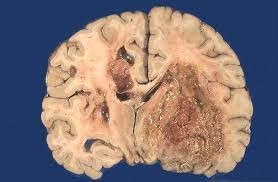Glioblastoma GBM is the most aggressive tumor that can form in the brain. The tumor can repeat formation even after treatment with surgery, chemotherapy and radiation.
Researchers discovered that a different molecular target, NEK2, evolved after OTS167 treatment for glioblastoma, and they used computer-based drug design to target NEK2.
The resulting NEK2 inhibitor, called CMP3a, was able to inhibit growth in pre-clinical models of glioblastoma, both in culture and in mouse brains. When combined with radiation, CMP3a has a synergistic effect to attenuate growth of glioblastoma cells in culture.
NEK2 is a poorly characterized kinase enzyme. The researchers found that NEK2 is differentially expressed in glioma stem cells, and it is required for growth of glioma clones in culture, as well as for growth and radiation resistance of a human glioblastoma tumor in the mouse model.
NEK2 protein binds to EZH2, an oncogenic histone H3 methyltranferase, and this binding protects EZH2 from protein degradation in the glioma stem cells. EZH2 was already known to regulate the self-renewal and survival of glioma stem cells.
Stabilizing EZH2, NEK2 promotes tumor propagation. Disrupting the NEK2-EZH2 interaction in cancer cells has the potential to target their cancer stem cell compartment.
Elevated EZH2 expression occurs in various human cancers, including prostate cancer, breast cancer and glioblastoma, and the studies have shown that elevated EZH2 is associated with tumor malignancy
Clinical study shows that glioblastoma brain tissues was closely associated with EZH2 expression. NEK2 expression also correlated with poor prognosis for the patients, and NEK2 was substantially elevated in recurrent tumors after therapeutic failure.
NEK2 play a key role in maintaining glioma stem cells by stabilizing the EZH2 protein, and the small molecule inhibitor CMP3a is a potential novel therapeutic agent for glioblastoma.
They found that EZH2 was protected post-translationally. They also found that NEK2 was the most up-regulated kinase gene in glioma spheres and that NEK2 expression showed a strong association with EZH2 expression in protein profiles for human cancers in the Human Protein Atlas.
The researchers found that NEK2 formed a protein complex with EZH2 to phosphorylate and protect EZH2 from proteasome-dependent degradation in glioma stem cells. They also showed that NEK2 promoted radiation resistance in glioma stem cells.
haleplushearty.blogspot.com


